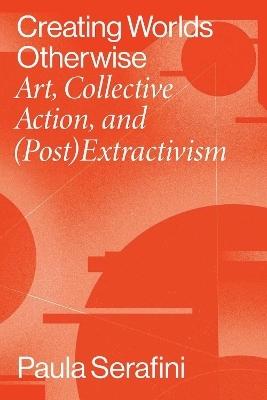
Creating Worlds Otherwise
Art, Collective Action, and (Post)Extractivism
Seiten
2022
Vanderbilt University Press (Verlag)
978-0-8265-0456-2 (ISBN)
Vanderbilt University Press (Verlag)
978-0-8265-0456-2 (ISBN)
Offers the narratives that subaltern groups generate around extractivism, and how they develop, communicate, and mobilize these narratives through art and cultural practices. The book reports on a research project and addresses questions regarding what post-extractivist worlds might look like as well as how such visions are put into practice.
Extractivism has increasingly become the ground on which activists and scholars in Latin America frame the dynamics of ecological devastation, accumulation of wealth, and erosion of rights. These maladies are the direct consequences of long-standing extraction-oriented economies, and more recently from the expansion of the extractive frontier and the implementation of new technologies in the extraction of fossil fuels, mining, and agriculture. But the fields of sociology, political ecology, anthropology, and geography have largely ignored the role of art and cultural practices in studies of extractivism and post-extractivism.
The field of art theory, on the other hand, has offered a number of texts that put forward insightful analyses of artwork addressing extraction, environmental devastation, and the climate crisis. However, an art theory perspective that does not engage firsthand and in depth with collective action remains limited and fails to provide an account of the role, processes, and politics of art in anti- and post-extractivist movements.
Creating Worlds Otherwise examines the narratives that subaltern groups generate around extractivism, and how they develop, communicate, and mobilize these narratives through art and cultural practices. It reports on a six-year project on creative resistance to extractivism in Argentina and builds on long-term engagement working on environmental justice projects and campaigns in Argentina and the UK.
It is an innovative contribution to the fields of Latin American studies, political ecology, cultural studies, and art theory, and addresses pressing questions regarding what post-extractivist worlds might look like as well as how such visions are put into practice.
Extractivism has increasingly become the ground on which activists and scholars in Latin America frame the dynamics of ecological devastation, accumulation of wealth, and erosion of rights. These maladies are the direct consequences of long-standing extraction-oriented economies, and more recently from the expansion of the extractive frontier and the implementation of new technologies in the extraction of fossil fuels, mining, and agriculture. But the fields of sociology, political ecology, anthropology, and geography have largely ignored the role of art and cultural practices in studies of extractivism and post-extractivism.
The field of art theory, on the other hand, has offered a number of texts that put forward insightful analyses of artwork addressing extraction, environmental devastation, and the climate crisis. However, an art theory perspective that does not engage firsthand and in depth with collective action remains limited and fails to provide an account of the role, processes, and politics of art in anti- and post-extractivist movements.
Creating Worlds Otherwise examines the narratives that subaltern groups generate around extractivism, and how they develop, communicate, and mobilize these narratives through art and cultural practices. It reports on a six-year project on creative resistance to extractivism in Argentina and builds on long-term engagement working on environmental justice projects and campaigns in Argentina and the UK.
It is an innovative contribution to the fields of Latin American studies, political ecology, cultural studies, and art theory, and addresses pressing questions regarding what post-extractivist worlds might look like as well as how such visions are put into practice.
Paula Serafini is a lecturer in creative and cultural industries in the Department of Business and Society at Queen Mary University of London.
Acknowledgments
Introduction
Chapter 1. Territories in Conflict: Art and Territorialization
Chapter 2. Our Bodies, Our Territories: Ecofeminism and the Ethics of Care
Chapter 3. Human Rights and the Rights of Nature: Generating Public Narratives
Chapter 4. Reclaiming the City: Urban Extractivism and Contested Cultures
Chapter 5. Our Place in the World: Autonomy, Sovereignty and Narratives of Self-Determination
Chapter 6. Worlds in the Making: Postextractivism and Ontological Design
Conclusion: Art and (Post)Extractivism
Notes
Bibliography
| Erscheinungsdatum | 23.06.2022 |
|---|---|
| Reihe/Serie | Performing Latin American and Caribbean Identities |
| Verlagsort | Tennessee |
| Sprache | englisch |
| Maße | 152 x 228 mm |
| Gewicht | 254 g |
| Themenwelt | Kunst / Musik / Theater |
| Naturwissenschaften ► Biologie ► Ökologie / Naturschutz | |
| Sozialwissenschaften ► Politik / Verwaltung ► Staat / Verwaltung | |
| Technik ► Bergbau | |
| ISBN-10 | 0-8265-0456-6 / 0826504566 |
| ISBN-13 | 978-0-8265-0456-2 / 9780826504562 |
| Zustand | Neuware |
| Informationen gemäß Produktsicherheitsverordnung (GPSR) | |
| Haben Sie eine Frage zum Produkt? |
Mehr entdecken
aus dem Bereich
aus dem Bereich
Planung · Recht · Verfahren
Buch | Hardcover (2024)
Springer Vieweg (Verlag)
CHF 89,95


